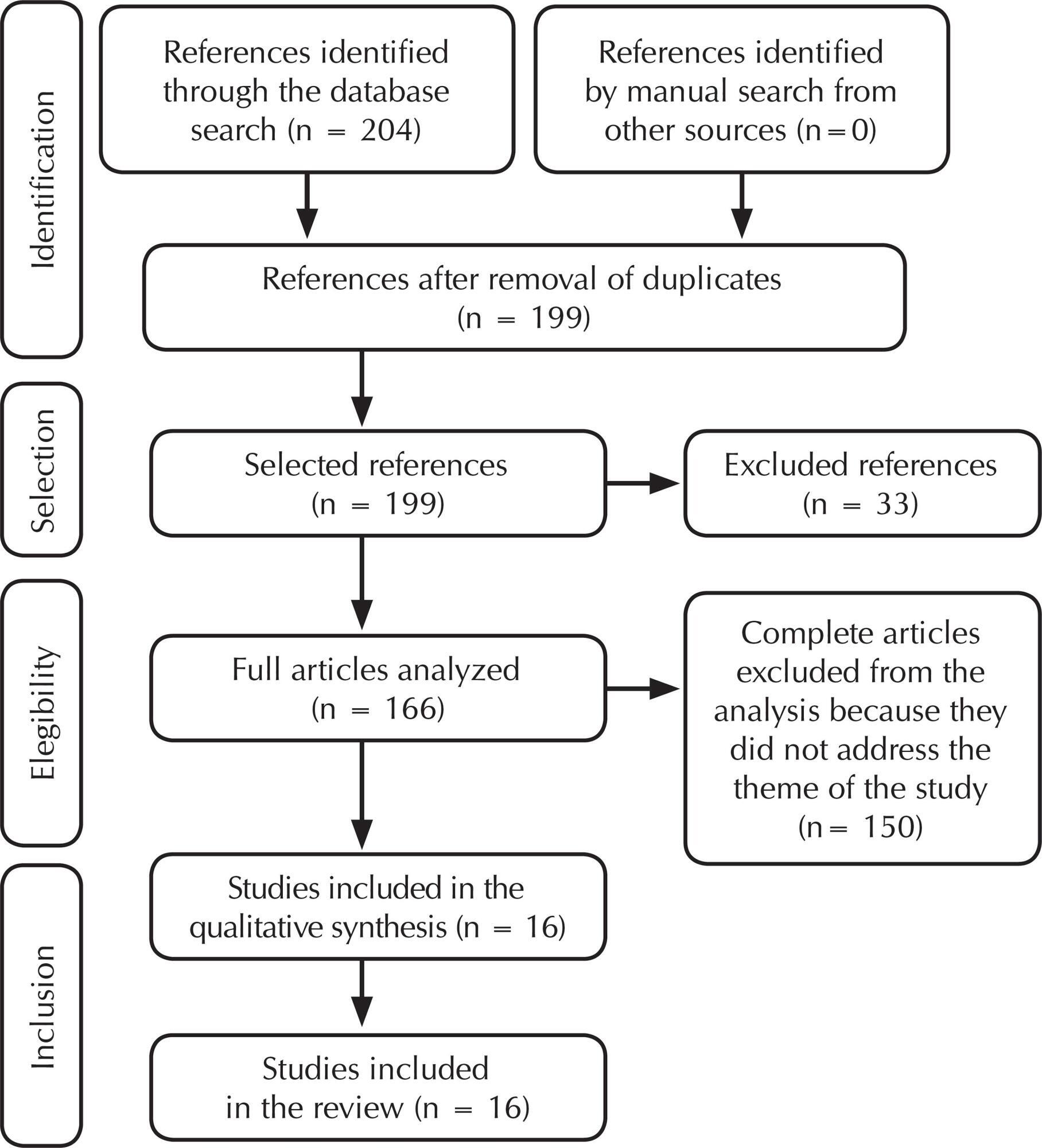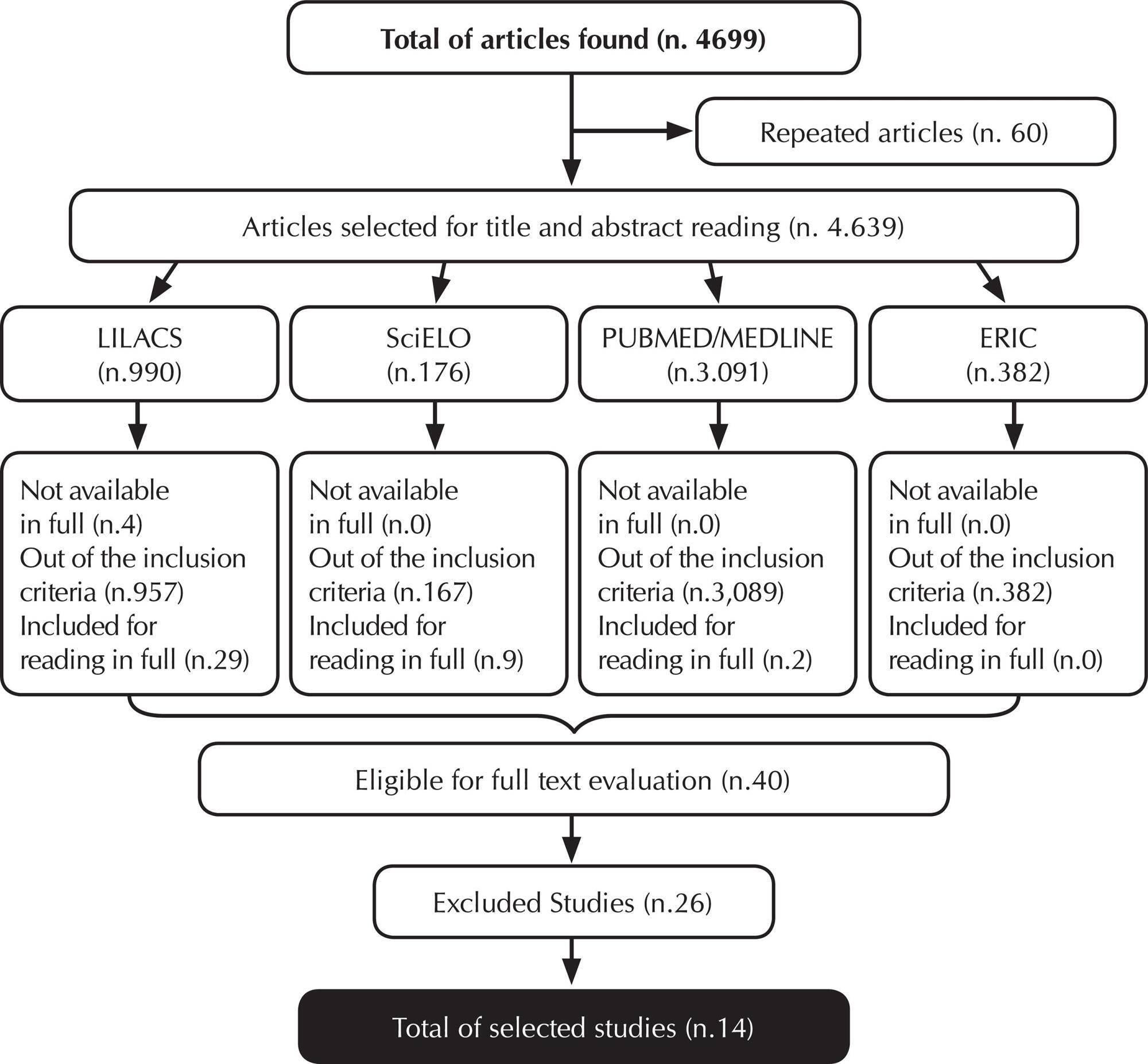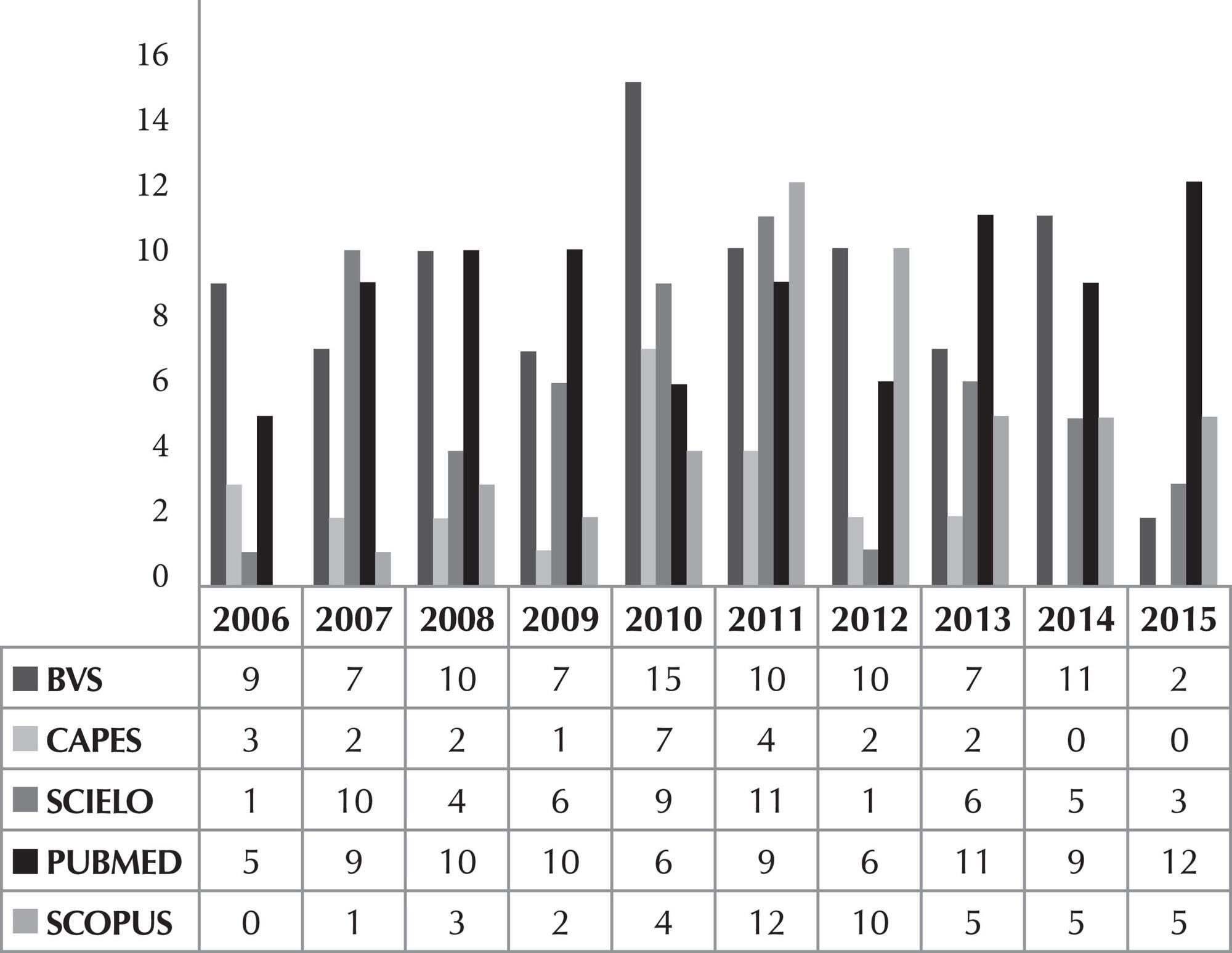-
EXPERIENCE REPORT01-01-2018
Death education: sensibility for caregiving
Revista Brasileira de Enfermagem. 2018;71:1779-1784
Abstract
EXPERIENCE REPORTDeath education: sensibility for caregiving
Revista Brasileira de Enfermagem. 2018;71:1779-1784
DOI 10.1590/0034-7167-2017-0018
Views0See moreABSTRACT
Objective:
to report the application of a participatory teaching-learning method on the themes death, dying, and associate care to highlight its applicability to the students.
Method:
report of application of participatory method in 22 students from the 6th period of the undergraduate program in Nursing and Obstetrics of a public university. The first stage focused on personal experiences of the students and the second on professional prospects. As resources for data collection we used music, drawing, drama, and photography.
Results:
after applying the method, the students assigned meanings to death and nursing care, reflected, criticized, and resignified experiences on the theme.
Conclusion:
the method was considered applicable and effective to achieve the objective, that is, it enables learners to act as protagonists of the teaching-learning process, building together a new perspective of end-of-life care.
-
EXPERIENCE REPORT01-01-2018
Community intervention in the Nursing education: experience report
Revista Brasileira de Enfermagem. 2018;71:1774-1778
Abstract
EXPERIENCE REPORTCommunity intervention in the Nursing education: experience report
Revista Brasileira de Enfermagem. 2018;71:1774-1778
DOI 10.1590/0034-7167-2017-0351
Views0See moreABSTRACT
Objective:
To report the implementation and results of community intervention projects used as a strategy for teaching and developing people and communities in the training of community health nursing specialists at the Centro de Formação de Saúde Multiperfil (Multi-profile Health Training Center), Angola.
Method:
Report of experience of the use of community intervention projects in nursing.
Results:
Community intervention projects have contributed to the learning of students and to the promotion of health, citizenship and the empowerment of individuals and communities. Its implementation is in the fourth year, and 16 projects have already been developed in 2 distinct neighborhoods, and this year the intervention will cover a third.
Conclusions:
Nursing teaching should adopt strategies that lead the student not only in the path of professional autonomy, but, above all, in the empowerment of people and communities. Community intervention is undoubtedly important in this area.
-
EXPERIENCE REPORT01-01-2018
The Pororoca effect on permanent education in health: about the interaction research-work
Revista Brasileira de Enfermagem. 2018;71:1768-1773
Abstract
EXPERIENCE REPORTThe Pororoca effect on permanent education in health: about the interaction research-work
Revista Brasileira de Enfermagem. 2018;71:1768-1773
DOI 10.1590/0034-7167-2017-0462
Views0See moreABSTRACT
Objective:
to build municipal responsibility with the permanent education in health policy from the interaction between research and innovation of work practices.
Method:
experience reports structured through dialogic meetings that allowed the participative diagnosis and strategic administration considering research in health education.
Results:
from the activities and interactions, we identified active forces in the reinvention of training for workers in the municipal network of health services, in which we found three streams: “inside and outside interactions”, “movement towards meetings” and “strategic collective arrangements”.
Final considerations:
through action research and a collaborative critique, collective movements were constructed, they showed ways to produce new directions in health education and allowed the strategic creation of the Núcleo de Educação Permanente as a responsibility of the municipal government, not depending on Federal policies.
-
REVIEW01-01-2018
Educational technologies and practices for prevention of vertical HIV transmission
Revista Brasileira de Enfermagem. 2018;71:1759-1767
Abstract
REVIEWEducational technologies and practices for prevention of vertical HIV transmission
Revista Brasileira de Enfermagem. 2018;71:1759-1767
DOI 10.1590/0034-7167-2016-0333
Views0See moreABSTRACT
Objective:
to assess available evidence on educational technologies and practices for prevention of vertical HIV transmission.
Method:
LILACS, PubMed, Scopus, BDENF, between April and May 2016, with the descriptors: “Vertical Transmission of Infectious Disease”, “HIV”, “Health Education” and “Technology”.
Results:
there are 16 articles published between 2000 and 2014, mostly Brazilian and African, Cross-sectional and with low level of evidence. The studies covered the use of hard technologies, through video, radio and telephone, and soft, emphasizing, in particular, counseling.
Conclusion:
the studies recognize the importance of educational activities as a tool for health promotion in the context of vertical HIV transmission, despite reporting the need for constant training of professionals and urgency in the renewal of educational concepts and practices. Therefore, it is recommended to expand and consolidate health counseling and emphasize the role of nurses as an important actor in this setting.

-
REVIEW01-01-2018
Liberating critical pedagogy of Paulo Freire in the scientific production of Nursing 1990-2017
Revista Brasileira de Enfermagem. 2018;71:1751-1758
Abstract
REVIEWLiberating critical pedagogy of Paulo Freire in the scientific production of Nursing 1990-2017
Revista Brasileira de Enfermagem. 2018;71:1751-1758
DOI 10.1590/0034-7167-2017-0699
Views0See moreABSTRACT
Objective:
To analyze the theoretical and methodological application of Paulo Freire’s critical pedagogy in the scientific production of nursing.
Method:
An integrative review was carried out with consultation of the databases: LILACS, BDENF, MEDLINE, PUDMED and CINHAL. We included studies in the Spanish, English and Portuguese languages, published from 1990 to 2017.
Results:
A total of 38 articles were analyzed, of which the main concepts adopted were: dialogue/dialogicity, awareness/critical awareness and questioning. Regarding the application of the method, it was noticed the predominance of the adoption of elements such as culture circles, thematic phase and horizontality relation of the nurse with the individuals involved.
Conclusion:
Nursing has partially appropriated the Freire’s referential. However, it reveals the intentionality of a transformative practice that requires deepening for the implementation of the method in its full.

-
REVIEW01-01-2018
Supervised internship in undergraduate education in nursing: integrative review
Revista Brasileira de Enfermagem. 2018;71:1740-1750
Abstract
REVIEWSupervised internship in undergraduate education in nursing: integrative review
Revista Brasileira de Enfermagem. 2018;71:1740-1750
DOI 10.1590/0034-7167-2017-0340
Views0See moreABSTRACT
Objective:
to analyze the evidence available in the literature on the contributions of the Supervised Internship in nursing training in Brazil and the teaching-learning methods employed.
Method:
integrative review of the literature, with search of articles published between 2002 and 2016, in PubMed, LILACS, SciELO and Eric databases.
Results:
Of the 4,699 articles consulted, 14 met the inclusion criteria. The analysis of these studies revealed three thematic categories: the understanding about the role of Supervised Internship; the teaching-learning processes employed; and their contributions to the training of nurses.
Final considerations:
this is a fundamental element in the academic training, since, depending on the didactic-pedagogical organization, it makes possible the (re) signification of the acquired knowledge throughout the course and realizes the professional competences. The teaching-learning methods are structured by the critical pedagogy, being the active methodologies the main choices of the authors.

-
REVIEW01-01-2018
Nursing higher education in MERCOSUR: a bibliometric study
Revista Brasileira de Enfermagem. 2018;71:1732-1739
Abstract
REVIEWNursing higher education in MERCOSUR: a bibliometric study
Revista Brasileira de Enfermagem. 2018;71:1732-1739
DOI 10.1590/0034-7167-2017-0405
Views0See moreABSTRACT
Objective:
to identify productions that approach nursing high education in member states of MERCOSUR.
Method:
bibliometric study with quantitative approach carried out in search mechanisms, such as BVS, Capes, SciELO, Scopus and PubMed, between 2006 and 2015. It was found 301 articles about nursing education in MERCOSUR.
Results:
point to concern for the nurse’s education for public health policies, for teacher’s education and the teaching-learning process. However, publications regarding technologies associated with distance education on health field are low.
Conclusion:
this study contributes with discussion in nursing education field when points to the themes regarding the production about nurses’ education in MERCOSUR, specially, the range of targets set up in the Educational MERCOSUR agreement.

-
REVIEW01-01-2018
Educational technologies for health education on stroke: an integrative review
Revista Brasileira de Enfermagem. 2018;71:1724-1731
Abstract
REVIEWEducational technologies for health education on stroke: an integrative review
Revista Brasileira de Enfermagem. 2018;71:1724-1731
DOI 10.1590/0034-7167-2017-0041
Views0See moreABSTRACT
Objective:
to identify in the scientific literature the educational technologies used in the health education process related to stroke.
Method:
integrative review, whose eligibility criteria of the articles were: match the keywords “health education” and “stroke”; be a research paper; be in Portuguese, English and Spanish; be available electronically in the databases LILACS, PubMed/Medline, Scopus and CINAHL; year of publication between 2000 and 2016.
Results:
24 publications were found. The analysis was carried out by means of analytical and interpretive readings. There were many educational technologies used in the health education process for stroke.
Final considerations:
the printed material for general public stood out, aiming to the recognition of alert signs of the disease and the emergency decision-making before suspicious cases of the disease.
-
ORIGINAL ARTICLE12-08-2023
Simulation-based training in Leprosy: development and validation of a scenario for community health workers
Revista Brasileira de Enfermagem. 2023;76:e20230114
Abstract
ORIGINAL ARTICLESimulation-based training in Leprosy: development and validation of a scenario for community health workers
Revista Brasileira de Enfermagem. 2023;76:e20230114
DOI 10.1590/0034-7167-2023-0114
Views0See moreABSTRACT
Objectives:
To build and validate a clinical simulation scenario designed to instruct community health workers (CHWs) in active leprosy case detection.
Methods:
Methodological study involving the development of a simulated clinical scenario and content validation by experts. The Content Validity Index (CVI) was used to determine the level of agreement among the judging commitee, and a descriptive analysis of their recommendations was performed.
Results:
A simulated scenario with a simulated participant was developed — a simulation characterized by low complexity, moderate physical/environmental fidelity, moderate to high psychological fidelity, and high conceptual fidelity, lasting 50 minutes and capable of training up to 10 CHWs simultaneously. The scenario was validated by 14 experts, with a CVI exceeding 80% for all components.
Conclusions:
The validated clinical simulation possesses attributes that make it highly reproducible in various national health contexts, thereby contributing to the global “Towards Zero Leprosy” strategy.
-
ORIGINAL ARTICLE12-08-2023
Knowledge and practices about health among Quilombola men: contributions to health care
Revista Brasileira de Enfermagem. 2023;76:e20230138
Abstract
ORIGINAL ARTICLEKnowledge and practices about health among Quilombola men: contributions to health care
Revista Brasileira de Enfermagem. 2023;76:e20230138
DOI 10.1590/0034-7167-2023-0138
Views1See moreABSTRACT
Objective:
to analyze health knowledge and practices among Quilombola men.
Methods:
a qualitative, descriptive study, carried out with 40 men from two Quilombola communities in Santa Izabel do Pará, state of Pará, Brazil. Individual interviews were carried out using a semi-structured script. Text corpus was subjected to analysis with Interface de R pour les Analyses Multidimensionnelles de Textes et de Questionnaires 0.6, alpha 3, through Descending Hierarchical Classification.
Results:
among participants, eight (20.00%) were aged 55 to 59 years. 382 text segments were identified, with 299 (78.27%) being used, generating five lexical classes, which made up two subcorpora. The classes were organized into four thematic axes, covering knowledge about health and practices to prevent and solve health problems.
Final considerations:
men highlighted popular/traditional wisdom permeated by biomedical knowledge, translating their understanding of how to act to remain or become healthy.

-
ORIGINAL ARTICLE10-06-2023
Ethical problems in nursing teleconsultations for people living with HIV during the Covid-19 pandemic
Revista Brasileira de Enfermagem. 2023;76:e20220754
Abstract
ORIGINAL ARTICLEEthical problems in nursing teleconsultations for people living with HIV during the Covid-19 pandemic
Revista Brasileira de Enfermagem. 2023;76:e20220754
DOI 10.1590/0034-7167-2022-0754
Views0See moreABSTRACT
Objectives:
to understand the ethical problems experienced by primary health care nurses in using nursing teleconsultations for people living with the human immunodeficiency virus during the coronavirus pandemic.
Methods:
qualitative research, anchored in Constructivist Grounded Theory. Data was collected between July and September 2020, with 17 participants.
Results:
the first category highlights the ethical problems in conducting teleconsultations, managing high demand, communication barriers, and risks related to data security. The second emphasizes the potential of teleconsultations in communication and access, by generating changes in the work process and the use of protocols to guide clinical practice.
Conclusions:
nurses’ work in digital mode requires professional qualification, with a view to stimulating reflection on teleconsultation practice, ethical-moral deliberation and combating stigma, and also adopting data security-centered conduct.
-
12-04-2023
Ethical dilemmas at the end of life: a reflection from the Philosophical Perspective of Luigina Mortari
Revista Brasileira de Enfermagem. 2023;76:e20220759
Abstract
Ethical dilemmas at the end of life: a reflection from the Philosophical Perspective of Luigina Mortari
Revista Brasileira de Enfermagem. 2023;76:e20220759
DOI 10.1590/0034-7167-2022-0759
Views0See moreABSTRACT
Objectives:
to reflect on the ethical dilemmas involved in the care of patients at the end of their lives.
Methods:
this is a theoretical-reflective study based on the ethics of care proposed by Luigina Mortari.
Results:
discussing care involves addressing the ways of being inherent to human existence and understanding the unique characteristics of this condition. Ethical care constitutes an action driven by interest in the other and by the perception of their need. Ethical dilemmas are a part of end-of-life care, making it essential to maintain respectful assistance that considers the patient’s autonomy, using strategies for expressing their wishes, and ensuring continuous clear and empathetic communication among all those involved in providing care.
Final Considerations:
issues related to being, stemming from one’s reality of dependency and vulnerability, contribute to the emergence of ethical dilemmas present in care actions.
-
ORIGINAL ARTICLE12-04-2023
Overview of nursing ethics teaching in Brazilian public higher education institutions
Revista Brasileira de Enfermagem. 2023;76:e20220808
Abstract
ORIGINAL ARTICLEOverview of nursing ethics teaching in Brazilian public higher education institutions
Revista Brasileira de Enfermagem. 2023;76:e20220808
DOI 10.1590/0034-7167-2022-0808
Views0See moreABSTRACT
Objectives:
to outline the teaching of ethics in undergraduate Nursing programs in Brazilian public higher education institutions.
Methods:
descriptive and exploratory study, carried out through the documentary analysis of pedagogical projects of undergraduate Nursing programs in Brazil.
Results:
153 active undergraduate Nursing programs were found, of which 106 provide the pedagogical project. In addition to deontological teaching, the teaching of ethics was identified in a transversal way associated with themes such as Social Context, Hospital and Community Care, Pharmacology, Systematization of Nursing Care, Surgical Nursing, Epidemiology, Palliative Care, Management in Nursing, Diversity, Women’s, Children’s, Adolescent’s, Adult’s and Older People’s Health, and Mental Health.
Final Considerations:
the challenge in teaching nursing ethics is its integration with each action of caring, teaching and managing.

-
ORIGINAL ARTICLE12-08-2023
Validation of telesimulation in the care of late preterm newborns with hypoglycemia for nursing students
Revista Brasileira de Enfermagem. 2023;76:20220438
Abstract
ORIGINAL ARTICLEValidation of telesimulation in the care of late preterm newborns with hypoglycemia for nursing students
Revista Brasileira de Enfermagem. 2023;76:20220438
DOI 10.1590/0034-7167-2022-0438
Views0See moreABSTRACT
Objective:
To develop and validate a telesimulation scenario for nursing students in the care of late preterm infants with hypoglycemia.
Methods:
A methodological study conducted between August 2021 and May 2022 in a virtual environment involved constructing and validating the scenario with 10 experts, and testing it with 10 students. The content validity index assessed validity, with a threshold of 80% or higher, and suggestions were analyzed using semantic approximation.
Results:
Validation confirmed the appropriateness of all 14 scenario items, with an overall index of 97.8% and clarity and relevance indices of 98.5%. During testing, the overall index was 99.7%, with the “resources” item receiving the lowest score. Adjustments were made to objectives, technical terms, resources, and target audience based on feedback.
Conclusion:
Telesimulation is a widely accepted educational technology for training nursing students, with potential to enhance teaching quality and neonatal care.
-
ORIGINAL ARTICLE11-10-2023
Construction and validity of educational technology in audiovisual media on premature newborn care
Revista Brasileira de Enfermagem. 2023;76:e20220403
Abstract
ORIGINAL ARTICLEConstruction and validity of educational technology in audiovisual media on premature newborn care
Revista Brasileira de Enfermagem. 2023;76:e20220403
DOI 10.1590/0034-7167-2022-0403
Views0See moreABSTRACT
Objectives:
to construct and validate an educational video storyboard about care for premature newborns at home.
Methods:
a methodological study, with the construction of an educational video storyboard, validated with 14 judges. Content was selected from scoping review. For data collection, a validated instrument was used. The criterion for validity was agreement greater than 80%, analyzed using the Content Validity Index.
Results:
the storyboard construction was guided by the Cognitive Theory of Multimedia Learning theoretical framework. Construction and validity took place from May to December 2020. The storyboard’s final version lasted 10 minutes, and was validated in terms of objective, structure, presentation and relevance, with a Content Validity Index of 0.9.
Conclusions:
the storyboard of the educational video proved to be valid and adequate for health promotion in developing care for premature newborns at home.

-
ORIGINAL ARTICLE12-08-2023
Early ambulation and dhikr complementary therapies effect on intestinal peristaltic in post-open cholecystectomy patients
Revista Brasileira de Enfermagem. 2023;76:e20220636
Abstract
ORIGINAL ARTICLEEarly ambulation and dhikr complementary therapies effect on intestinal peristaltic in post-open cholecystectomy patients
Revista Brasileira de Enfermagem. 2023;76:e20220636
DOI 10.1590/0034-7167-2022-0636
Views0ABSTRACT
Objectives:
to analyze and determine the effect of a combination intervention of early ambulation and dhikr therapy on intestinal peristaltic recovery in post-open cholecystectomy patients.
Methods:
a pre-experimental design with one group pre and post-test design was used. The samples were 15 post-open cholecystectomy patients which were selected using the purposive sampling technique. The data were collected using the instrument observation sheet and analyzed using the Wilcoxon test. Early ambulation used standard operational procedure in the hospital and dhikr therapy was carried out at 2 hours post-operation for 10-15 minutes.
Results:
there was an effect of early ambulation and dhikr therapy on intestinal peristaltic recovery in post-open cholecystectomy patients with general anesthesia (Z=-3.442; p=0.001).
Conclusions:
a combination of early ambulation and dhikr therapy can be recommended as interventions to improve intestinal peristaltic in a post-open cholecystectomy patient with general anesthesia.
Keywords:Anesthesia, GeneralCholecystectomyComplementary TherapiesEarly AmbulationPerioperative NursingSee more
Search
Search in:
Nuvem de Tags
Adolescente (85) Atenção Primária à Saúde (239) COVID-19 (91) Criança (91) Cuidados de Enfermagem (269) Educação em Enfermagem (151) Educação em Saúde (139) Enfermagem (930) Enfermagem Pediátrica (86) Estudantes de Enfermagem (77) Estudos de Validação (131) Família (87) Idoso (208) Promoção da Saúde (99) Qualidade de Vida (104) Saúde do Trabalhador (86) Saúde Mental (145) Saúde Pública (82) Segurança do Paciente (150) Tecnologia Educacional (100)



